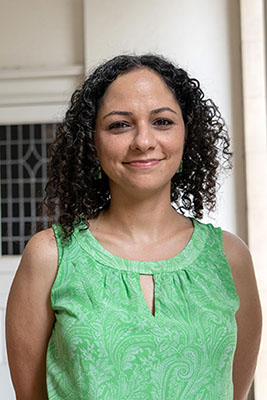Dickinson College is closed Sunday, Jan. 25 through Monday Jan. 26.
Faculty Profile
Mireille Rebeiz
Associate Professor of French & Francophone and Women's, Gender & Sexuality Studies (2018)Contact Information
Bosler Hall
--
https://www.linkedin.com/in/mireille-rebeiz-ph-d-69b748147/
Bio
I am Chair of Middle East Studies and Associate Professor of Francophone Studies & Women's, Gender, & Sexuality Studies. I received my first Doctorate (PhD) in Francophone Studies from Florida State University and my second doctorate (SJD) in International Law from Penn State Dickinson Law. I also hold a Master’s degree in International Law and Human Rights from Université de Rouen in France, and a Bachelor’s degree in Law from Université Saint-Joseph in Lebanon. My teaching and research are interdisciplinary and focus on the intersectionality of law, gender, sexuality, oral history, and trauma in the context of armed conflicts with a focus on the Middle East and North Africa. I have written and successfully published monographs, peer-reviewed essays in French and English, and editorials in national and international presses. My second book "Hezbollah in International Law" appeared with Edinburgh University Press (2026). It examines Hezbollah's legal status as a State or non-State actor in armed conflict (with Israel and in Syria). It also studies Hezbollah's unlawful activities in Lebanon since 1982 and State responsibility. My first book, "Gendering Civil War. Francophone Women’s Writing in Lebanon", for which I earned the AAUW American Fellowship, appeared with Edinburgh University Press in 2022. Nominated for the John Leonard Prize, this book examines French-language narratives published between the 1970s and the present day by Lebanese women authors writing on the Lebanese civil war of 1975-1991. My most recent research project focuses on the Beirut barracks bombing of 1983 that killed 241 American servicemembers and 58 French parachutists. In this project, I explore gaps in Lebanese, French, and American histories and write veterans’ oral stories.
Education
- B.A., Université Saint-Joseph Jésuite, Lebanon, 1999
- M.A., Université de Rouen, France, 2004
- Ph.D., Florida State University, 2012
2025-2026 Academic Year
Fall 2025
FREN 102 Elementary French
Complete first-year course. Intensive study of the fundamentals of French grammar, with special attention given to pronunciation and oral expression. Cultural readings in the context of language acquisition.Prerequisite: 101 or the equivalent.
LAWP 290 Gend ID & Intl Hum Rights Law
Cross-listed with WGSS 302-02. This course examines the intersection of gender identity, gender violence, and international human rights laws. It explores the definitions of gender identities and their protections (or lack of) in main international human rights texts. Through the lens of gender and legal feminist theories, this course examines various human rights such as the right to equality and non-discrimination based on sex, the right to privacy and family life, the right to peace and clean environment. It studies cases of war crimes, crimes against humanity, genocide, torture and other cruel, inhuman, or degrading treatment or punishment, and enforced disappearance of persons. This course offers a transnational legal perspective and gives examples from different legal traditions (common law and civil law) and different countries.
WGSS 302 Gend ID & Intl Hum Rights Law
Cross-listed with LAWP 290-03. This course examines the intersection of gender identity, gender violence, and international human rights laws. It explores the definitions of gender identities and their protections (or lack of) in main international human rights texts. Through the lens of gender and legal feminist theories, this course examines various human rights such as the right to equality and non-discrimination based on sex, the right to privacy and family life, the right to peace and clean environment. It studies cases of war crimes, crimes against humanity, genocide, torture and other cruel, inhuman, or degrading treatment or punishment, and enforced disappearance of persons. This course offers a transnational legal perspective and gives examples from different legal traditions (common law and civil law) and different countries.
Spring 2026
WGSS 100 Intro to WGSS
This course offers an introduction to central concepts, questions and debates in gender and sexuality studies from US, Women of Color, queer and transnational perspectives. Throughout the semester we will explore the construction and maintenance of norms governing sex, gender, and sexuality, with an emphasis on how opportunity and inequality operate through categories of race, ethnicity, class, ability and nationality. After an introduction to some of the main concepts guiding scholarship in the field of feminist studies (the centrality of difference; social and political constructions of gender and sex; representation; privilege and power; intersectionality; globalization; transnationalism), we will consider how power inequalities attached to interlocking categories of difference shape key feminist areas of inquiry, including questions of: work, resource allocation, sexuality, queerness, reproduction, marriage, gendered violence, militarization, consumerism, resistance and community sustainability.
FREN 102 Elementary French
Complete first-year course. Intensive study of the fundamentals of French grammar, with special attention given to pronunciation and oral expression. Cultural readings in the context of language acquisition.Prerequisite: 101 or the equivalent.
